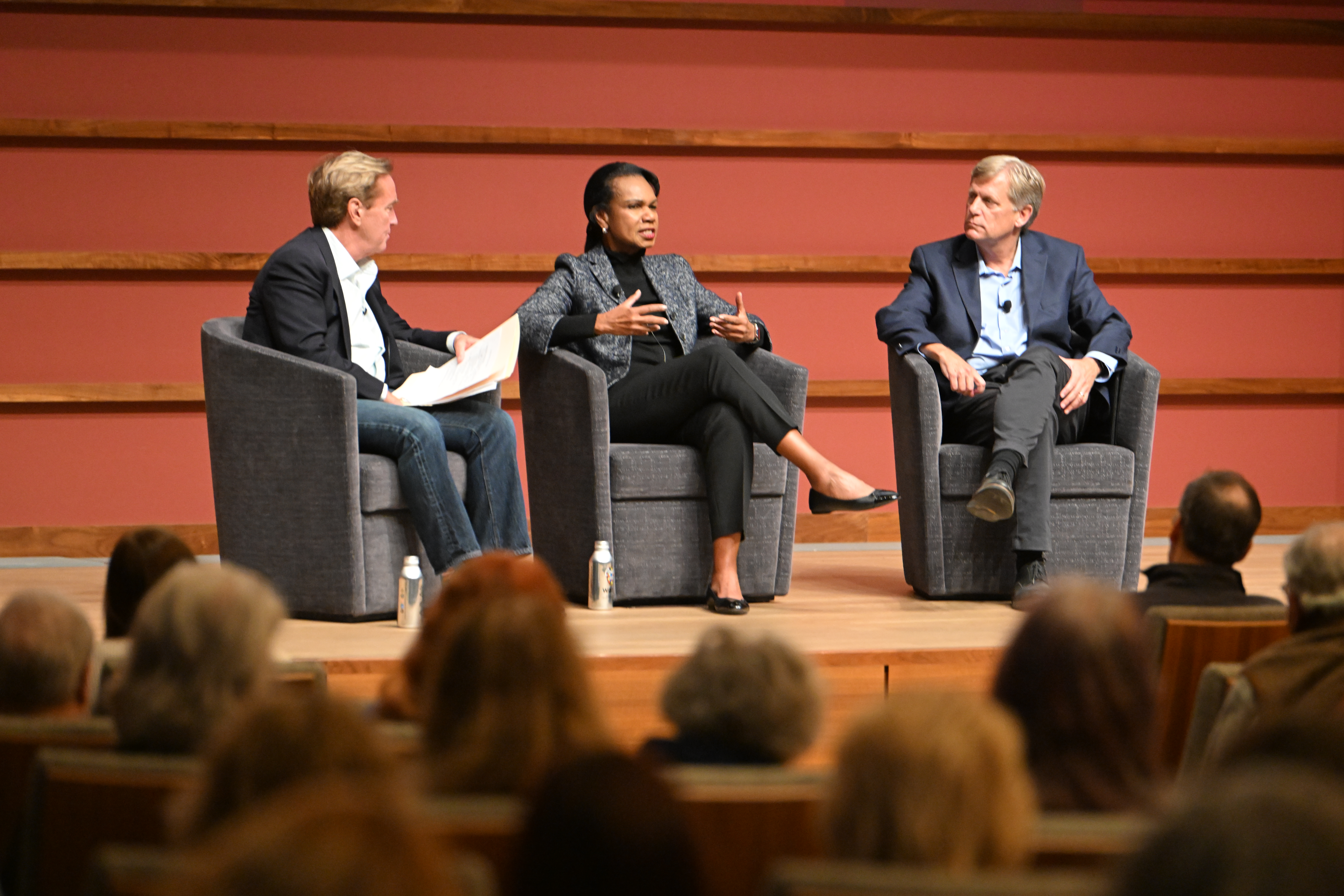One week before the 2024 election, Stanford professors Condoleezza Rice, the former U.S. Secretary of State and director of the Hoover Institution, and Michael McFaul ’86 M.A. ’86, director of the Freeman Spogli Institute and former U.S. ambassador to Russia, emphasized the importance of institutions in maintaining democracy at a Monday panel.
“Democracy is the institutionalism of freedom and the United States has extraordinary institutions,” Rice said. “So, I trust American institutions. The problem for younger democracies is that those institutions are often not completely consolidated.”
Rice said that in some countries with less democratic structures, it is “very easy” for “a strong man… to subvert those institutions and cast them aside.” She named Vladimir Putin of Russia and Viktor Orbán, the prime minister of Hungary, as prime examples.
Rice and McFaul spoke in a discussion moderated by James Steyer ’78 J.D. ’83 – adjunct professor at the Stanford Graduate School of Education and founder and CEO of Common Sense, a nonpartisan education organization. The event was hosted in Hauck Auditorium as part of Stanford University’s speaker series class, “Election 2024: Democracy on the Ballot.”
“One of the first things that autocrats go after is civil society. If you have a strong civil society, it’s very hard to subvert democracy,” Rice said, referring to the consequences of the upcoming election on the global battle between democracy and autocracy.
In response to Steyer’s question about the outcome of the Russia-Ukraine war and how it will be impacted by next week’s election, McFaul said he was “nervous” about trying to foresee the election effects on global democracy and cautioned that “our theories are not very good at trying to predict these things.”
McFaul said Russia’s invasion of Ukraine is a “horrific, barbaric war.”
“There are not a lot of issues in the world today that are black and white,” McFaul said. “To me, this one’s pretty black and white in terms of who is good and who is evil.”
With the implications of the election on the Russia-Ukraine war weighing particularly heavily, Rice and McFaul expressed a resolute stance on the necessity for continued U.S. support for Ukraine.
McFaul criticized the pace of the current U.S. approach to aid.
“I think we’ve been too slow in giving [Ukraine] the means,” McFaul said. “We’ve been too constrained. That, to me, is not the way you win wars.”
McFaul said it’s both in international and American interest that Ukraine prevails, due to the rippling consequences that could be felt in many other regions around the world.
Rice agreed with the assessment that U.S. aid as “too little too late.” She critiqued excessive hand-wringing in U.S. debates about supplying weapons, like tanks and fighter aircraft, to Ukraine while Russia was on its “back foot” in the first year. She said a more decisive approach could have led to a different outcome.
“If we had just given them what it took at that moment, they might have won this war outright,” Rice said.
Rice then shifted to current conflicts in the Middle East and described three central areas of focus, namely Gaza, Lebanon and the Arab Gulf.
“The future of the Middle East is a set of states that are modernizing, and where women’s rights actually are beginning to emerge,” Rice said. “I didn’t say democracy. I think that’s a ways off.”
Rice contended that the conflict in Gaza will become “more of a kind of hit-and-run counter-terrorism operation for the Israelis” because the escalating humanitarian crisis in Gaza needs resolution. Israel would benefit from the reinvestment of its reserves into the economy, Rice said.
Rice praised the efficacy of the recent intelligence operation in Lebanon run by Israel in assassinating key leadership officials within Hezbollah, including Nasrallah, the chief. Heavy Israeli airstrikes in southern Lebanon at the start of October have reduced Hezbollah’s capabilities, taking out many key figures within the terrorist organization. Hundreds of civilians, including journalists, humanitarians and children, have also been killed during the attacks.
“They are going to push Hezbollah back across the Litani [River],” she said. “When Hezbollah is harmed enough, I think you will see a reemergence of the normalization efforts between the Gulf Arabs and the Israelis.”
Rice said these efforts align with the modernization plans of United Arab Emirates President Mohamed bin Zayed and Crown Prince Mohammed bin Salman in Saudi Arabia.
Marde Ross ’67, a member of the audience, told The Daily that she thought Rice and McFaul “explained the ins and outs of the Middle Eastern landscape well,” breaking down the complicated dynamic into a much clearer roadmap.
McFaul said he viewed China — the last of the autocratic powers discussed on Monday evening — as the United States’ first-priority country when thinking about security, prosperity and values. Simultaneously, he stressed the importance of not “overshooting the target” concerning the focus given to China.
“Yes, China is a very powerful country that demands our attention, but we are powerful too. We have allies,” he said. “We need to get our allies together and stop giving them technology that’s going to be used against us.”
Liz Kniss, three-time Palo Alto mayor who was in attendance in the audience, told The Daily that the event was so “mesmerizing… the hour and a half flew by.”
“They did a great job of quelling some of the anxiety and concern we all feel,” Kniss said.
Many of the students currently enrolled in the class said they felt inspired by the buzz surrounding the compelling discussion, including Liesel Petersmann ’28 and Will Gibbs ’28.
“It was a very unique Stanford experience, hearing from two leading figures in public policy and international affairs,” Gibbs said. Petersmann said the event was “eye-opening,” revealing the issues facing democracy today.
Looking forward to election week, Rice reiterated the global implications. “There is a lot at stake here,” she said.
A previous version of this article misstated Steyer’s class year. The Daily regrets this error.
